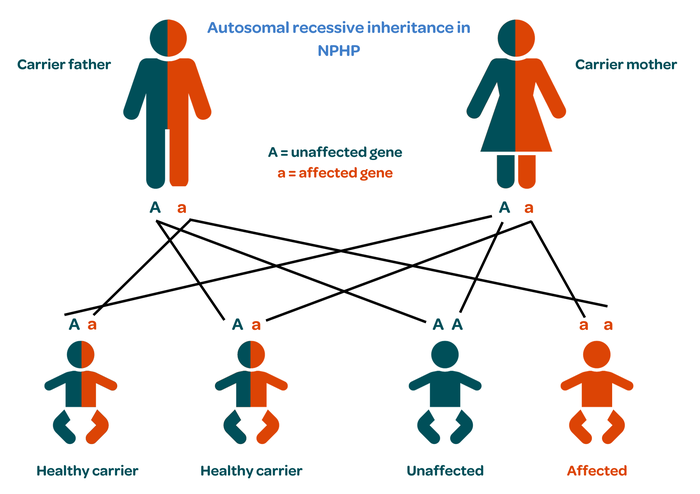What is nephronophthisis (NPHP)?
Nephronophthisis (NPHP) is an inherited kidney condition that causes cysts and/or scarring in the kidneys. Over time, this can lead affect the kidney’s function and may eventually lead to kidney failure.
The name comes from Greek and means ‘disintegration of nephrons’, which is one of the signs of the condition when tissue is viewed under a microscope.
NPHP is thought to affect around 1 in 75,000 people in the UK although exact figures are currently unknown. It is usually first diagnosed in babies and young children. Boys and girls are affected equally.
What are the signs and symptoms of NPHP?
The first signs of NPHP may be noticed before birth during an ultrasound scan of the baby at around the 18th week of pregnancy. The scan may show that the baby has bright kidneys and/or kidneys containing lots of cysts (small fluid-filled sacs). There may also be less amniotic fluid than normal. This is the watery fluid produced by the baby’s kidneys while it is in the womb.
In newborn babies, the kidneys may be so large that the tummy appears swollen. An ultrasound scan may show cysts in the kidneys and blood tests may show that kidney function is reduced.
Children with NPHP are often very thirsty and prefer water to food. This can lead to poor nutrition and slow growth. Bed-wetting is often seen in school-aged children due to increased urine production. Anaemia and high blood pressure are also common.
In rare cases, NPHP is not diagnosed until adulthood when kidney failure may have already occurred.
What causes NPHP?
NPHP is a genetic condition that causes mutations of the cilia, tiny hair-like structures that help with transmitting messages to the body’s cells. Damage to the cilia can lead to cysts or scarring in the kidney, which affects how well it can function. This can eventually lead to kidney failure.
How is NPHP diagnosed?
NPHP is usually diagnosed in babies and young children by an ultrasound scan.
Blood and urine tests may be used to examine kidney function and a kidney biopsy may be recommended.
Genetic testing may also be available.
Does NPHP affect other parts of the body?
NPHP itself is only known to affect the kidneys. However, the genetic changes that cause NPHP can also cause other conditions that affect different parts of the body, including the eyes, liver, bones and central nervous system.
Does NPHP run in families?
NPHP is a genetic condition so it can run in families. So far, mutations in 20 different genes have been found to cause NPHP.
Everybody has two copies of these genes, one from each parent.
Healthy people have two normal copies.
Carriers have one copy that works normally and one that doesn’t. Carriers are usually healthy because the normal copy can still do its job. However, they can still pass NPHP on to their child.
In people with NPHP, neither copy of the gene works properly.
When both parents are carriers, a child could be healthy with two normal genes, a healthy carrier like their parents with one healthy and one faulty gene or affected with both genes being faulty. This pattern is called autosomal recessive inheritance.
If NPHP is confirmed early in a pregnancy, antenatal counselling may be offered to discuss options about the future of the pregnancy.
If both parents have been confirmed as carriers of NPHP, pre-natal and/or pre-implantation genetic diagnosis (PGD) may be offered. This involves testing embryos for NPHP during a cycle of in vitro fertilisation (IVF) and only transferring unaffected embryos to the mother’s womb to ensure the birth of a child without the condition.

How is NPHP treated?
There are currently no direct treatments for NPHP, so the focus is on reducing symptoms to protecting kidney function. Care should be led by specialist teams as the condition can vary in severity and individual assessment is very important.
Regular blood and urine tests are needed to check for any kidney damage, as well as blood pressure checks. People with mild kidney problems may just need regular monitoring, with perhaps some dietary adjustments and/or nutritional supplements.
If kidney failure develops, dialysis and/or transplant may be needed. In some cases, a child’s kidneys become so large that they have to be removed to make space in the stomach for feeding.
Where can I get more information or support about NPHP?
For more information on NPHP, including its diagnosis, symptoms and treatment, visit the Ciliopathy Alliance.

Publication date: 11/2023
Review date: 11/2026
This resource was produced according to PIF TICK standards. PIF TICK is the UK’s only assessed quality mark for print and online health and care information. Kidney Care UK is PIF TICK accredited.